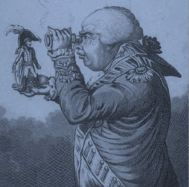 A few months after the storming of the Bastille, a large crowd of women that gathered at the Hôtel de Ville - the city hall of Paris - on 5th October to complain about the price of bread and other necessities. They forced their way into the building and threatened to set fire to the official papers, saying that they were all the city council had busied themselves with since the revolution. One of the vanquishers of the Bastille, Stanislas Maillard, arrived and attempt to persuade the women to meet with the council to discuss their grievances, but instead they chose to take their complaints to the National Assembly in Versailles.
A few months after the storming of the Bastille, a large crowd of women that gathered at the Hôtel de Ville - the city hall of Paris - on 5th October to complain about the price of bread and other necessities. They forced their way into the building and threatened to set fire to the official papers, saying that they were all the city council had busied themselves with since the revolution. One of the vanquishers of the Bastille, Stanislas Maillard, arrived and attempt to persuade the women to meet with the council to discuss their grievances, but instead they chose to take their complaints to the National Assembly in Versailles.
During the march the crowd of women - now six or seven thousand strong, many of whom carried weapons - sang about how they would remove King Louis XVI from the foreign influences of the court (particularly those of his wife and her favourites) and bring him back to Paris. When the women arrived at Versailles, hundreds of them invaded the National Assembly, disrupting the proceedings by hurling abuse at the clerical deputies. Following some way behind the women were a contingent of the National Guard led by The Marquis de Lafayette.
Many of the women marchers and guards were angered by rumours that foreign troops had abused the symbols of the revolution. After dark a group of these broke into the Palace, killed two of the Royal bodyguards, and ransacked Marie Antoinette's chambers while she escaped through a secret passage. The crowd gathered outside then demanded that she show herself, impressed by her bravery the crowd's abuse turned to acclaim.
That night, a small deputation of women met with the king who agreed to return with them to Paris the following day. So, on the 6th October 1789 a long procession set off from Versailles to Paris comprising the king and his family, the delegates of the National Assembly, the National Guard and, in pride of place, the women of Paris, who sang “We Have the Baker, the Baker’s Wife, and the Baker’s Son. We Shall Have Bread.” The baker was the king who had ordered that the royal supply of flour be brought back to Paris as part of the procession.
The Liberty, Fraternity, Equality pages on the George Mason University web-site includes Stanislas Maillard's testimony of the Women’s March to Versailles.
Customised search for historical information
6 October 2008
On this day in history: Parisian women bring Louis XVI back to Paris, 1789
Subscribe to:
Post Comments (Atom)















2 comments:
You have great blog I can read some world history on your site
Thank you for the kind words
Post a Comment